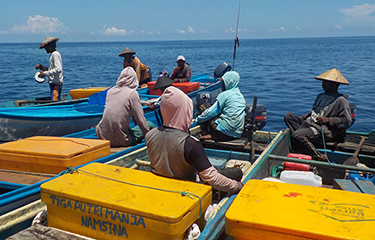Indonesia’s Ministry of Marine Affairs and Fisheries (MMAF) signed an agreement with the Marine Stewardship Council on 25 October strengthening the country’s commitment to creating a marine economy more reliant on sustainable seafood.
The memorandum of understanding, signed between MMAF Secretary General Antam Novambar and MSC Asia Pacific Regional Director Patrick Caleo, will create a national fisheries improvement program for tuna, mud crab, crab, shrimp, squid, large pelagic fish, and small pelagic fish. The MSC will work toward improving the sustainability of these fisheries and helping in marketing of sustainable fishery products in Indonesia and internationally.
In a statement, Novambar said the agreement – the second forged between the Indonesian government and MSC – will provide numerous benefits to the country, which is the second-largest producer of wild seafood in the world.
“Seafood is the main source of protein for local consumption and food security as well as the primary contributor to export products. Therefore, Indonesian fisheries management must also pay attention to the health of stocks and ocean ecosystems, which are central to the world's marine biodiversity,” Novambar said. “MMAF and the MSC work closely with stakeholders from fishers, government, scientists, and businesses at local and global levels to support a blue economy and Indonesia's 2025 vision. Through this collaboration, MMAF hopes that the agreed programs can be fully realized and targets achieved to provide maximum benefits for all parties.”
Through the agreement, MSC will continue to facilitate “inter-stakeholder understanding of fisheries in Indonesia, starting from fishery commodities, fleets, fishing, supply chains, and prices, as well as domestic and international markets,” according to Caleo.
“MMAF and MSC agree that improving the way our ocean is fished is critical in order to provide food, income, and employment for a growing population,” Caleo said. “This second MoU shows our continued commitment to collaborate on initiatives to safeguard Indonesia's ocean resources and fish supply for future generations.”
The previous MoU, signed in 2019, moved eight Indonesian fisheries into a transitionary program toward MSC certification, and eight other fisheries received MSC funding to set up fishery improvement projects. It also created structural support to provide 12 Indonesia tuna fisheries MSC certifications and 46 fish-processing facilities with MSC chain of custody certification, along with one foodservice firm. Along with fisheries and facilities, 24 Indonesian fishery experts were certified as MSC fisheries standard experts.
Under the new MoU, MSC will provide technical guidance and public awareness campaigns focused on encouraging sustainable fisheries management and the sale and purchase of sustainable products.
Photo courtesy of Masyarakat dan Perikanan Indonesia







